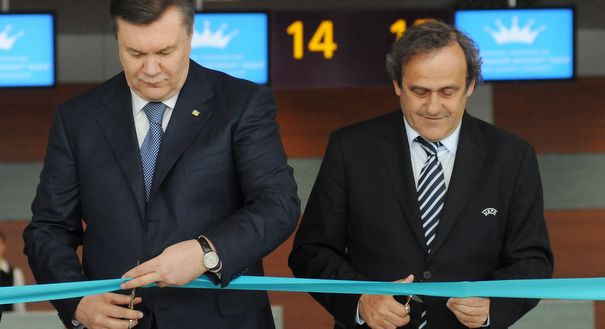In light of the deteriorating political situation in Ukraine, especially the catastrophic treatment of opposition politician Yulia Tymoshenko, some observers, pundits, and even football fans, have asked for the cancellation or postponement of this year’s European Football Championship tournament in Ukraine.
I am not sure this is the right way to approach the problem. Politically motivated sanctions, economic or other, have rarely had any positive effect on the targeted regime. A boycott would only strengthen the spiteful resolve of the regime in Kiev. It would also mean that for four weeks, thousands of camera teams, journalists, and observers would not be in a country that so urgently needs every form of attention and scrutiny it can get—if only as the by-product of some sports reporting. Tens of thousands of football fans from abroad would not travel to Ukraine as ambassadors of the free world. Ukrainians would not have the chance to tell these visitors about the grim truth of daily life in a dictatorship. Also, a boycott would unjustly punish Poland, the co-host of this year’s tournament, for other people’s misdeeds. In short, a boycott would not help anyone.
But the international community can also not just stand helplessly on the side lines while a despot reaps the benefits of a huge PR festival designed to cover up the true nature of his regime.
However, going ahead as planned with the tournament need not be a moral defeat for organizers and sports fan alike. Quite to the contrary. With a little creativity, the event offers a huge once-in-a-lifetime opportunity to undermine the Yanukovich regime’s communications strategy just as the games are going on. The key lies in branding, or, more to the point, re-branding. If Kiev wants to create the faux image of a modern, democratic political reality in Ukraine, the aim must be to create a more truthful image for viewers around the globe. Here is what can be done:
- UEFA, the event’s organizer, in collaboration with the tournament’s corporate sponsors and human rights organizations, should immediately create a new NGO called “Fair Play in Ukraine” which organizes conferences, workshops, exhibitions, and other activities in all four Ukrainian towns hosting games.
- A consortium of leading international PR and advertising agencies should be invited to create a full, officially UEFA-sponsored campaign around this new body. The agencies should do this pro bono.
- UEFA should make all events organized by the new body part of the official program of the tournament, so they can’t easily be cancelled or shut down by Ukrainian authorities. All of the activities should highlight how far Ukraine is from real fair play in its domestic politics.
- Leading sports and entertainment celebrities and human rights activists should be recruited as publicly recognizable ambassadors for the cause. Rarely has celebrity diplomacy been so warranted.
- The new NGO, its logo, and core messages should be given a certain percentage of advertising space and time in the stadiums and on air.
- The losses in advertising revenues should be compensated at least in part by special tax breaks granted to all participating organizations.
- The official UEFA logo for the tournament, which will be embroidered on all players’ uniforms, should be altered and include the logo of the new foundation or some other message related to the “Fair Play in Ukraine” campaign.
- The official EU delegation in Ukraine should become a sponsor of the campaign. So should the European Parliament.
- UEFA’s official tournament website should invite Ukrainian bloggers and activists to use the platform for exchange, discussion, and reporting. Websites of sponsors and affiliated organizations should be included in a large, censorship-free web platform for open debate on Ukraine.
- All official foreign dignitaries attending the games should be sent a pin or ribbon with the campaign’s logo to wear during official functions.
In all of this it is important to make a very fine distinction between the Ukrainian people and the government in Kiev. Ukrainians must not be victimized by a campaign that attempts to highlight the very opposite: that they are the indeed victims of a corrupt and brutal regime.
Once such an idea gets traction, there is no creative limit to more new and playful ways to get the message across. If done systematically, the tournament’s image-building power would be taken away from the regime in Kiev and turned from a regime-friendly PR instrument into a tool for political change. The regime itself would be forced to swallow the bitter pill, as it could not simply cancel the tournament without a massive loss of face.
This leads to the question whether a football tournament should be willfully politicized in such a way. Well, they already are, just take a look the papers. International sports events have become rare occasions on which a multifariously fragmented global community comes together as one. This gives sports organizations such as the UEFA, the IOC, and FIFA, to name but a few, enormous political weight. They can no longer claim to be unaffected by political developments in the very nations they rely on to stage their world events. They are political organizations by default, even though they’ve been trying hard to be in denial about that fact. If they want to live up to that reality, if they want to retain their good reputations, and if they want to make sure they can cash in on the big events like they have in the past, they need to start thinking politically. They need to realize the enormous potential they have as forces for good. And they need to turn into shrewd political operators. Ukraine offers a great chance to do so.



.png)

.png)
